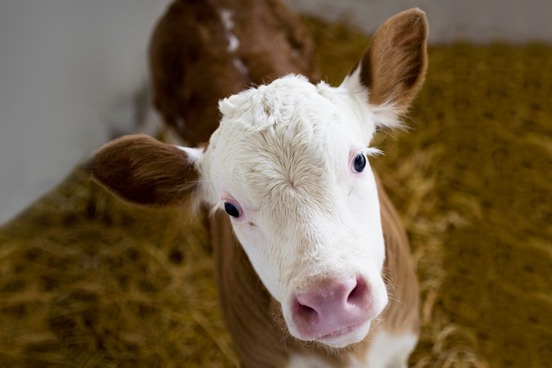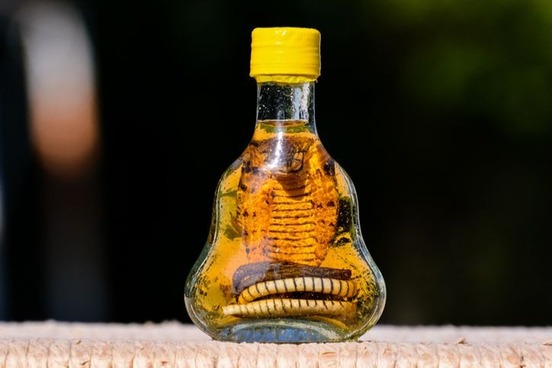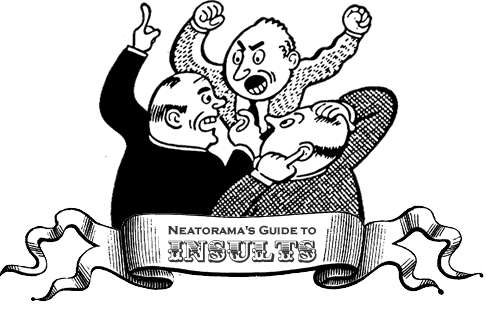Definition — a boastful and self-important person; a strutting little fellow
Once upon a time book titles were a touch more … adventurous than they are today. Take, for example, the slim volume of songs and anecdotes the British publisher J. Fairburn foisted on an unsuspecting public at the turn of the 18th and 19th centuries: The Cockolorum songster, and convivial companion, for 1800: Being a collection of monstrous good, monstrous droll, and monstrous bad, songs, introduced by some eccentric anecdotes of my cousin, the noble grand cock. Also a few cockolorum sentiments. Yes siree, they don’t title ’em like they used to…
In addition to describing a boastful person, cockalorum can be used in referring to the boastful talk (and also for the game of leapfrog. If cockalorum suggests a crowing cock, that’s because the word probably comes from kockeloeren — an obsolete Dutch dialect verb meaning «to crow.”
Naturally, she was jealous when her mother, after glimpsing Shaw, said, “he was a well-scrubbed old cockalorum, with frightful teeth.”
— The Independent, (London, Eng.), 12 Mar. 2011
Definition — an unprincipled but shrewd person
There is much that we do not know about snollygoster: where the word comes from, whether it is connected to snallygaster (“a mythical nocturnal creature that is reported chiefly from rural Maryland, is reputed to be part reptile and part bird, and is said to prey on poultry and children”), and whether this is the sort of word that one should avoid putting on a resume.
What we do know is that snollygoster was first used in the nasty politics of 19th century America. One amateur definition of the word dates to 1895, when a newspaper editor explained «a snollygoster is a fellow who wants office, regardless of party, platform or principles….»
Now here I am, a rale self-propelling double revolving Snolly Goster, ready to attack anything but a combination of thunder-lightning-smoke-railroad-iron, and hot water.
—Democratic Free Press (Detroit, MI), 1 Jan. 1846
Pillock
Definition — a very stupid or foolish person
Pillock (which has also on occasion been spelled pilloch, pillok, and pillick) is one of the hundreds of euphemisms for the male sexual organ in the English language. The Oxford English Dictionary records the earliest known use of the word from the mid-16th century (a fruitful time for genitalia euphemisms), and for several hundred years this was apparently the main sense of the word. However, beginning in the late 20th century pillock took on another meaning, which is that of an idiot or fool of some sort. Both of these uses are almost entirely confined to British English, and the word has little currency in the United States.
There is a season-ticket holder at Southampton to whom every referee will always be a “daft pillock.”
—The Guardian (London, Eng.), 17 Jan. 1977
Definition — a fawning subordinate; a suck-up
Lickspittle (the etymology is pretty self-explanatory with this word) is part of a grand pantheon of English words for sycophants. We have bootlicker, toadeater, ass-kisser, apple-polisher, and fart-catcher … wait, scratch that last one; a fart-catcher is a footman. The point is, we have many words for the sort of person who, you know, licks spit. Although the word was long thought to have been the product of the 19th century, recent findings show that we have been referring to lickspittles since the middle of the 17th.
They are most of them Barbers, Taylors, Panders and Procurers, Parasites and Lick-spittles: There are also by report some gallant Courtiers amongst them.
—Joseph Hall, Psittacorum Regio, the Land of Parrots, 1669
Definition — an excessively faultfinding person
It is not often that we know who created a particular word, despite the claims that are made about such-and-such writer inventing this-or-that word; such claims are usually false. In the case of smellfungus, however, we not only know who coined the word (Laurence Sterne), we also know who it is supposed to represent (Tobias Smollett). Stern created a hypocritical character named Smelfungus in his 1768 book A Sentimental Journey through France, a satire on Smollett, whose Travels through France and Italy had been published two years earlier.
The matter of whether smellfungus is properly pluralized with an -i or an es has never been established. Both forms are found in occasional use, and you should employ whichever suits your fancy.
These were diluted into a combined mass of travels, by the Smellfungi and Mundungi within the century, and blazoned forth in all the pomp and parade of novelty, preceded by a very pretty preface, in which the tourist affects to be led, like blushing maiden, to the printing office, by the relentless persuasion of friends.
—The Sunday Times (London, Eng.) 21 Sept. 1823Jason Bateman plays ruthless spelling bee contender Guy Trilby, a smellfungus who is determined to obliterate any child in his path.
— The Tampa Bay Times (St. Petersburg, FL), 20 Mar. 2014
Definition — ninny; simpleton, fool
The word ninny is probably a shortening and alteration of «an innocent» (with the «n» from «an» getting transferred to the noun) and «hammer» adds punch. Innocent hammer, while a fine choice of name for your Metallica polka cover band, did not have quite what it takes to make it in English as a fixed phrase.
Horses, will bee head-strong as vnnurtured Lobcockes, and snap their bridles in pieces as fast as hops; the powerfull prouender shall make them swell in the belly like a sullen girle in the cheeke, or a wench after toying and that will cracke girts apace: but for conclusion diuers women shall saddle their poore Husbands backes, and make plaine Ninny hammers of Noddies.
—Thomas Dekker, The Owles Almanacke, 1618Any ninnyhammer can challenge me to prove that this or that chemical, medicine, food or poison is not absorbed through the skin.
— William Brady, The Hartford Courant, 9 May 1966
Definition — a stubborn person who insists on making an error in spite of being shown that it is wrong
Supposedly, this insult originated with an illiterate priest who said mumpsimus rather than sumpsimus («we have taken» in Latin) during mass. When he was corrected, the priest replied that he would not change his old mumpsimus for his critic’s new sumpsimus.
So we have literally generations of American editors who have been enforcing this preposterous rule, for which there is no legitimate basis and which is invisible to everyone who is not a newspaper editor. And if the over/more than furor is any precedent, pointing that out will produce grumbling mumpsimuses.
— John McIntyre, The Baltimore Sun, 7 Oct. 2017
Definition — an unmanly man; a mollycoddle (a pampered or effeminate boy or man)
Milksop literally means «bread soaked in milk.» Chaucer was among the earliest to use milksop to describe an unmanly man (presumably one whose fiber had softened). By the way, the modern cousin of milksop, milquetoast, comes from Caspar Milquetoast, a timid cartoon character from the 1920s.
Milk also serves as compound indicating cowardice in milk-livered (“kind of like lily-livered, but with more milk and fewer lilies”). Should you have need of an adjective meaning “resembling or of the nature of a milksop” you are in luck, as English has two such words, milksoppy and milksopping.
I’ll be bound, for Charles he’s been seein’ to the poor fellow, here these milksops sit as if ‘were nailed to the stools ’cause they’re got a wife, would’nt give ‘um for a squadron o’ye, how do’st ‘do Charles did’st give the poor fellow something to put ‘um comfortable?
—Anne Newport Royall, The Tennessean, 1827
Definition — an awkward, gawky young man
Hobbledehoy rhymes with boy: that’s an easy way to remember whom this 16th century term insults. Its origin is unknown, although theories about its ancestry include hobble and hob (a term for «a clownish lout”). The earliest known use of the word comes from a 1540 translation of Gulielmus Gnaphaeus’s The Comedye of Acolastus, in which it is used in an attributive sense, referring to young men’s «hobledehoye tyme» (further explained as «the yeres that one is neyther a man nor a boye, at which yeres our voyce changeth»).
Definition — shyster; a lawyer whose methods are underhanded or disreputable
The petti part of this word comes from petty, meaning «insignificant» (from the French petit, “small»). As for fogger, it once meant «lawyer» in English. According to one theory, it may come from «Fugger,» the name of a successful family of 15th- and 16th-century German merchants and financiers. Germanic variations of «fugger» were used for the wealthy and avaricious, as well as for hucksters.
When Lincoln took the train to Washington to assume the presidency in 1861, sometimes traveling incognito in the dead of night to avoid assassins, a scathing newspaper editorial described the president-elect as a “facetious pettifogger” who was “no more capable of becoming a statesman” than a “braying ass can become a noble lion.”
— Chuck Raasch, St. Louis Post-Dispatch (St. Louis, MO), 7 Apr. 2016
Definition — a foolish or absentminded person
The earliest meaning of mooncalf was a false pregnancy, a growth in the womb supposedly influenced by a bad moon.
…in that they haue not a charge of their bodies but the cure and care of their soules and as Midwiues to discerne the moone calfe from the perfect fruite of weomen so Preachers should not bring forth moone calues.
—Ralph Tyler, Five Godlie Sermons, 1602
Mooncalf then grew a number of additional senses outside the womb. One is a literary word for a deformed monster (for instance, in Shakespeare’s The Tempest, Stephano entreats Caliban, «Mooncalf, speak once in your life, if thou beest a good mooncalf”). Another sense is that of “simpleton.”
Thou Mercury very Ridiculous, Thou Bloxford flye,Thou Moon calfe, born that very hour, on that very dismall fifth day of the moneth (you remember the Gun-powder Treason) when thy brother G. Faux was caught with a dark Lanthorne….
—John Booker, A Rope for a Parret, 1644
Definition — a mountebank; a person who sells quack medicines from a platform
Quacks (also known as quacksalvers) were a bit nimbler several hundred years ago, if the etymology behind some of the words for them is any indication. Both saltimbanco and mountebank involve climbing, or jumping up onto a bench. Saltimbanco comes from the Italian word of the same spelling, which literally means “one that jumps upon a bench,” and mountebank comes from the Italian montimbanco (montare, “to mount” & in, “in” & banca “bench”).
There was Priam likewise, that came for an Unguent for a burn; but the Saltinbanca had not enough, for the whole City of this poor Prince was all burnt.
—Cyrano de Bergerac, Satyrical Characters (trans. by ‘a person of honour’), 1658
Definition — one given to finding out and getting invited to good feasts
The smellfeast is a special kind of parasite; one who is able to detect the presence of fine food and drink before it is on the table. Some 19th century editions of Noah Webster’s dictionary included a secondary definition, “A feast at which the guests are supposed to feed upon the odors only of the viands,” but this sense has long since fallen out of fashion.
This is the Practice of your Smell-feast Friends, while you keep a plentiful Table they are your most Humble and Obedient Servants, but when the Accommodation fails, like Tartars, they seek for other Pastures.
—Anon., The Fables of Pilpay, a Famous Indian Phylosopher Containing Many Useful Rules for the Conduct of Humane Life, 1699
Published August 10, 2021

You called me what?
WATCH: The Best Old-Timey Insults We Should be Using Today
Everyone knows a primo insult or two, even if your personal rules of decorum prohibit their usage. But, if you think about it, there aren’t many new insults (or swear words, for that matter). The ones you heard from that guy in middle school are pretty much the same ones you hear now.
Let’s hop in the time machine and head back a couple of hundred years. These words and phrases might seem rather quaint and out of place now, but back then, they got your attention. “Hey! You scobberlotcher! Thy vile canker-blossom’d countenance curdles milk and sours beer!” Let’s examine a few more, shall we?

gobermouch
This is an old Irish term for someone who likes to meddle in other people’s business. Everyone knows a busybody, right?
Don’t let your gobermouch-in-law or next-door gobermouch have any more control over you than they already do. Shut the blinds and privatize the social media.
The Irish language and culture is known for more than just sizzling insults. For example, how much do you know about St. Patrick’s Day?

gnashnab
Gnashnab is a word from the 1700s meaning “someone who [just] complains all the time.” Contemporary synonyms include nitpicker, moaner, and grumbler.
It’s just as true now as it was back then—no one likes a gnashnab.

snoutband
A snoutband is someone who always interrupts a conversation to correct or contradict the person speaking. Every social group has a snoutband, who thinks they know everything.
They probably don’t know the meaning of this word, though. At least, not yet.

stampcrab
Someone who’s clumsy and heavy of foot would be considered a stampcrab. Make way for the office stampcrab, especially if you just poured yourself some coffee.

scobberlotcher
Mental Floss notes this word is “probably derived from scopperloit, an old English dialect word for ‘a vacation or a break from work’.”
A scobberlotcher is someone who avoids hard work … like it’s their job. The next time you catch someone dozing off at their desk, hit ’em with this one, even if it is just under your breath.

whiffle-whaffle
This is someone who wastes a lot of time. You could easily make the case that a scobberlotcher is also a whiffle-whaffle, correct? You most definitely don’t want to work with either of them.

zooterkins
The word zooterkins dates back to the 1600s, when it was used to communicate surprise or anger. It’s related to the mild oath zounds.
Zooterkins is less of an insult and more of something to yell after someone has insulted you. And, of course, to really pour salt on the wound, you can follow up with some other great words from this list.
If you’re looking for words to describe the untamed behavior of your children, check out these animal adjectives.

zounderkite
This is a Victorian word meaning “idiot.” An appropriate example with a contemporary angle (spoken with some irritation while driving on the highway): “That zounderkite just cut me off!”

bedswerver
Shakespeare coined this one to describe an adulterer. But BBC America thinks this would make a great band name, and they are totally on the mark. You’re at the show, the lights go down, and suddenly through the swirling fog and darkness you hear “Good evening, Cincinnati, how ya doing? We are … Bedswerver!”

fopdoodle
A fopdoodle is someone of little significance. So, if you’re letting someone get on your nerves who really shouldn’t have that power, remember that they’re just a fopdoodle. Then, carry on.

klazomaniac
This would be a person WHO CAN ONLY SPEAK BY SHOUTING. Is there anything else to say?

cumberworld
While this sounds somewhat like the name of a theme park, or perhaps actor Benedict Cumberbatch’s home, cumberworld was a term used to denote a person that was totally useless (just like fopdoodle).
They’re taking up your space and they’re breathing your air. Be off with you.

raggabrash
Do you know someone who is absolutely, completely disorganized or really, disgustingly grubby? That’s raggabrash. Example: “That boy is a total raggabrash!”

smellfungus
Anytime you invoke a smell of some type, you’re mining insult gold. There’s a great backstory here, too.
Author Laurence Sterne met author Tobias Smollett in 1764. Sterne was struck by how critical Smollett was of the places he visited. Afterward, Sterne would then go on to publish a book called Sentimental Journey Through France and Italy, and it included a character by the name of Smelfungus, who always griped and moaned.
So, if you’re on vacation and one of your friends complains about the food (or water/furnishings/airplane flight/cost), they’re a smellfungus and they’re stinking up that tropical air.

smell-feast
One smell-word is good, but two are great. And, that leads us to smell-feast.
Say you’ve laid out a big dinner for some invited guests. But, knock knock—what’s this? It’s an uninvited guest, and they’re expecting to have a slice or two of that fine roast beast on the table. This freeloader is known as a smell-feast. They probably didn’t bring a bottle of wine, either.
Maybe they’ll be less inclined to stay if you’re only serving squash … or gourd. Do you know the difference between the two?

flibbertigibbet
If you were known as a flibbertigibbet, it meant you were “a nosy, gossipy sort.”
It can also apply to a “flighty or frivolous woman,” though for the record, we will state this one can apply to a “flighty or frivolous man,” too. The word is also meant to be an imitation of what mindless chatter actually sounds like.

foozle
You’d probably hear this one coming out of the home of an old married couple: “Ye olde foozle, ye forgot to lock the door again!”
The word foozle means “a conservative, out-of-date person, especially an old man; dodo, fogy.” You can also use this word to imply a bungled effort on someone’s part. Say your first shot off the 18th tee landed in the lake. Well, ya foozled that one.

shot-clog
You know that one person who always tags along on group outings … and you really don’t want them there, but you feel bad and they usually pick up the tab? Well, that person is known as a shot-clog. Shot refers to the bill, and the clog part is “anything that impedes motion or action; an encumbrance; a hindrance.” Bottom line: this shot-clog may bring some of the group down, but they offer to pay the bill so … another round for everyone!

rakefire
This word invokes the image of a sleek red sports car, right? But, we’ll defer to this definition of a rakefire for the real insult: “someone so uncool that they would outstay their welcome in someone’s house until long after the fire had burned down to just the last few embers.” And, if they get up and sneak into the kitchen late at night for a cold turkey leg, they’re a smell-feast, too.

mumblecrust
Mumblecrust isn’t a terribly flattering term. Although, if you are in fact a mumblecrust, you probably don’t care if you’re thrown this insult—you’ve got bigger issues.
The word refers to a toothless, haggard beggar (as portrayed in a medieval comedy show).

muckspout
We’ve all probably spent some time around one of these people. You might find them at sporting events or turn into one yourself during that nail-biter of a game.
A muckspout is someone who simply curses too much.

Do you remember what a klazomaniac is?
Have you added all these insults to your vocabulary yet? If so, show us your new insult knowledge by taking our quiz.
Take the quiz here!
slap
(noun, verb, adverb)
/slæp/
LISTEN

A slap is a sharp blow with an open hand and also the sound made by such a blow. The verb to slap means ‘to strike sharply with an open hand,’ ‘to hit your hand against something,’ and also ‘to put down with force.’ Informally, ‘to put or place quickly’ is also to slap. As an adverb, and quite informally, slap means ‘straight, directly.’
Example sentences
- The slap left a red mark on David’s cheek.
- Everyone in the room heard the slap.
- Rachel was punished for slapping her classmate.
- The speaker slapped the desk to get everyone’s attention.
- The secretary slapped her resignation letter on her boss’s desk.
- Joel slapped some butter on a slice of bread.
- The dog fell slap in the river.
Words often used with slap
slap down: to oppose or criticize sharply. Example: “Negotiations have reached an impasse, after the latest proposals were slapped down by the other side.”
slap in the face: a rebuke, attack, or insult. Example: “Frankly, the way the government has handled this issue has been a real slap in the face for democracy.”
slap on the back: a congratulatory gesture. Example: “You’ve all worked so hard to get this project finished on time; you deserve a slap on the back.”
slap on the wrist: a reprimand. Example: “Karen broke the speed limit, but the officer let her off with a slap on the wrist after she explained that it was an emergency.”
slap and tickle (UK): playful sexual activity. Example: “The young couple were pleased to have the house to themselves for a bit of slap and tickle.”
slapdash: careless, hasty. Example: “The teacher was disappointed in the student’s slapdash work.”
slap-bang: exactly. Example: “There was a hole, slap-bang in the middle of the floor.”
In pop culture
Watch Fred Astaire singing “Slap That Bass” in the 1937 movie Shall We Dance?
Additional information
In Scottish English, a slap is a gap or opening, as in a fence, wall, cloud bank, or line of troops, and also a mountain pass.
Did you know?
In UK English, slap is also an informal term for makeup. It was originally theatrical slang for stage makeup, but has come to be used for any makeup, especially if it is thickly or carelessly applied. Example: “I’ll just stick some slap on my face and then I’m ready to go.”
Origin
Both the origin of slap, meaning ‘a sharp blow with an open hand,’ as well as the sound it makes, and the date it appeared in English are uncertain. Some linguists believe it came into English in the early 17th century from the Low German slapp or slappe, which is of an expressive or imitative origin. Others believe slap existed in English much earlier, around the mid-15th century. If this is the case, it would have had and imitative origin on its own, and the similarity to equivalents in other Germanic languages (the Low German slappe and the German Schlappe, for example) is because of the sound itself. The figurative sense meaning ‘an insult or reprimand’ was first used in the early 18th century. The slap origin as a verb (meaning ‘to strike with an open hand’) is less certain, as it seems to have come from the noun in either of its origins, but linguists disagree whether it appeared in the late 15th or mid-17th century. Slap has been used as an adverb since the mid-17th century meaning ‘suddenly’ and since the early 18th century meaning ‘directly.’
Word of the Day is released Monday through Friday.
There is a crisis of insults on the Web. On one hand, the volume of flames is very high yet the quality is poor. Gone are the days of the razor-sharp wit of Oscar Wilde and Winston Churchill*, only to be replaced by a string of four letter words typed in ALL CAPS by n00bs (the latest of which is “FAIL”, itself a failure of coming up with a more scathing insult, if you think about it).
*For example:
«Some cause happiness wherever they go; others, whenever they go,» says Oscar Wilde.
George Bernard Shaw wrote to Winston Churchill, «I am enclosing two tickets to the first night of my new play; bring a friend….if you have one.» And Churchill wrote back, «Cannot possibly attend first night, will attend second……if there is one«
Well, it’s hard to teach wit — but all of us can learn the next best thing: the approximation of it by obfuscation, i.e. using big, difficult, and obscure words. So, to do our part in improving the quality of insults on teh Interweb, Neatorama has come up with a list of 10 Insulting Words You Should Know:
1. FRENCHIFY (v)

Analysis: We have the English to thank for this word. Most people implicitly understand that it means to become more like the French, but not a lot know the second or the third meaning. We’re still not sure which is more insulting.
2. BESCUMBER (v)
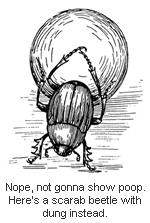
Analysis: Actually bescumber is just one of many words in the English language that basically mean “to spray with poo”. These are: BEDUNG, BERAY, IMMERD, SHARNY, and the good ol’ SHITTEN. In special cases, you can use BEMUTE (specifically means to drop poo on someone from great height), SHARD-BORN (born in dung), and FIMICOLOUS (living and growing on crap).
Alternative: If that is too vulgar, you can use BEVOMIT and BEPISS, which meanings should be obvious to you, as well as BESPAWL (to spit on).
Oh, and if you want to say poo without looking like you’re saying it, you can use ORDURE, DEJECTION, and EXCRETA. To mean something more specific, you can use MECONIUM (first feces of a newborn child), MELAENA or MELENA (the abnormally tarry feces containing blood from gastrointestinal bleeding), LIENTERY (diarrhea with undigested or partially digested food), and STEATORRHEA (fatty stool that’s hard to flush down).
Here are some words along the same line that may one day prove to be useful for you: TURDIFY (turn into turd), COPROPHAGIA (eating of feces [wiki]), and COPROPHILIA (Think 2 Girls 1 Cup [wiki — don’t worry, SWF], if you don’t know what this is, I shan’t corrupt you any further).
Let’s end entry number two with these two amazing words COPREMESIS and MISERERE, both of which mean fecal vomiting. Yes, fecal vomiting. It’s a medical emergency caused by the obstruction of the bowel (source).
3. MICROPHALLUS (n)
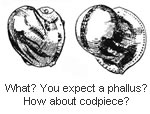
Analysis: Self explanatory.
Alternative: Insulting a man’s private part is a very reliable way to put him down (if he’s smaller than you) or to get beat up (if he’s larger than you). Usually, even a dimwit can decipher the meaning of this word, after all, it’s just a combination of “micro” and “phallus”.
So, to insult a physically larger opponent, we recommend you use these words instead: PHALLOCRYPSIS (retraction or shrinkage of the penis), CRYPTORCHID (undescendend testicles), and PHALLONCUS (tumor of the penis).
4. COCCYDYNIA (n)
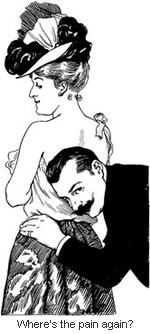
Analysis: It’s a real medical term: coccydynia is pain in the coccyx or tailbone. Most people simply call it «buttache.»
Similar: PROCTALGIA, PROCTODYNIA, PYGALGIA and RECTALGIA all mean pain in the butt.
Alternative: CERVICALGIA (pain in the neck), PHALLODYNIA or PHALLALGIA (both mean pain in the penis), and PUDENDAGRA (pain in the genitals).
The word «butt» is highly versatile in its vernacular use — you can say «butt face» or «hairy butt» — dem are fightin’ words — but it’s much better to use these instead: ANKYLOPROCTIA (stricture of the anus, the state of «tight-assity»), STEATOPYGOUS (fat-assed), DASYPYGAL (having hairy buttocks), and CACOPYGIAN (having ugly buttocks).
5. NINNYHAMMER (n)
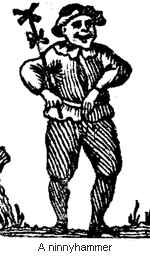
Analysis: The word «fool,» unless you’re Mr. T, is sometimes woefully inadequate to express the stupidity of the person you’re talking about. So use Ninnyhammer. Or at least NINNY.
Alternative: The English language is chockful of colorful words meaning stupid person, such as: DUMMKOPF, IGNORAMUS, JOBBERNOWL, GOWK, and WITLING.
For mental retardation, eschew the ubiquitous ‘tard — rather, use AMENTIA (extreme mental retardation because of inadequate brain tissue), CRETINISM (mental retardation associated with dwarfism, caused by the deficiency of a thyroid hormone, a person with cretinism is a CRETIN), and MORONITY (used to mean mild retardation of having a mental age of 7 to 12 years, now it’s an obsolete term though we still use the word moron).
6. BUNCOMBE (n)
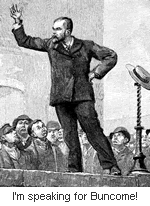
Analysis: Actually, you probably already know this word by its more common spelling: bunkum.
The origin of this word is fascinating. In 1819, a North Carolina congressman, the Honorable Felix Walker, was giving a rambling speech with little relevance to the current debate. He refused to yield the floor, and claimed that he wasn’t speaking for Congress but instead «for Buncombe» (a county in North Carolina he represented). That’s all it took.
Over time, the spelling changed to «bunkum,» and the meaning strangely changed to be «excellent.» Then it changed back in 1870, when a San Francisco gambler introduced a new game «banco» played with dice that were later found out to be loaded. Sure enough, BUNCO became known to mean swindle or cheat, and bunkum reverted back to its original meaning. (Source)
The word DEBUNK came directly from this: it’s just bunk(um) with the prefix de- (meaning to remove).
7. HIRCISMUS (n)
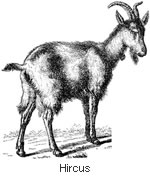
Analysis: Hircismus comes from the root word «hircus» which means goat in Latin. Someone must have thought smelly pits smelled like goats. Actually, this word combines two sources of great insult potential: smelly and armpits. Why this is not used more often in the discourse of hateful communication is beyond me.
Alternative: As we’ve mentioned, armpit is an untapped goldmine for insults. Here are some examples of words you can use: MASCHALEPHIDROSIS or MASCHALYPERIDROSIS (excessive sweating of the armpits). MASCHALOPHILOUS (sexual attraction to the underarms) and AXILLISM (the use of armpit for sex).
Smelling like goats is also a good source of insults (especially since goat is also a slang for a lecherous man). Try CAPRYLIC and HIRCINE (smelling like a pungent goat), and CAPRIC (resembling a goat).
8. CORPULENT (adj)
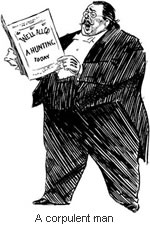
Analysis: Good ol’ fat is a reliable insult word. After all, nowadays, no one like a fatty … except Mauritanian men. That’s right: in the Islamic Republic of Mauritania, fat and Rubenesque women are sexy and desirable. So much so, that instead of the crash diet of the West, they have a similar but opposite program: crash feeding or «gavage,» where girls as young as 5 years old are force-fed milk, cream, butter, couscous and other calorie-rich food:
Girls as young as 5 and as old as 19 had to drink up to five gallons of fat-rich camel’s or cow’s milk daily, aiming for silvery stretch marks on their upper arms. If a girl refused or vomited, the village weight-gain specialist might squeeze her foot between sticks, pull her ear, pinch her inner thigh, bend her finger backward or force her to drink her own vomit. In extreme cases, girls died. (Source)
Interestingly, the ideal man is skinny (Mauritanians view portly men as womanish and lazy).
Alternative: ABDOMINOUS (potbellied), STEATOPYGOUS (fat-assed), and FUSSOCK (a very fat woman).
9. FEIST or FICE (n)
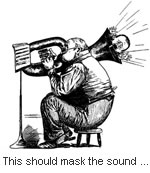
Analysis: You actually already know this word: feist is used throughout the Midland and Southern United States to mean a snappy, nervous and belligerent little dog. The adjective feisty which means «full of spirit or spunky,» comes from this word. But that’s not why it’s on this list (hint: #3!)
What you may not know is the true origin of the word. Feist comes from the Middle English fisten, which means to break wind (fist originally also meant flatus or fart). Feist is a special type of fart: the silent (and often deadly) type. Oh, and the word «fart» itself comes from another Middle English word farten or ferten, which in turn is from the Old English feortan.
Feist is the type of word that, if introduced to young adolescents, no doubt would spark a lifelong interest in learning new words.
Alternative: Fart is another one of those goldmines of insults. To obfuscate what you really mean, use instead: FLATUOSITY (fart). Other gems: EPROCTOLAGNIAC (someone aroused by flatulence, his own or someone else’s), CARMINATIVE (something that makes you fart), and BDOLOTIC (prone to farting).
10. CACAFUEGO (n)
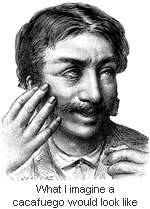
Analysis: Cacafuego literally means «shit fire» in Spanish. Anyone who boasts their new knowledge of insulting words from this article can be called a cacafuego.
That’s not the only interesting thing about it:
Cacafuego is also the nickname of a 16th century Spanish galleon captured by Sir Francis Drake (El Draque or The Dragon as he was known to his Spanish victims). The ship’s original name was Nuestra Señora de la Concepción (Our Lady of Conception), but for some reason it’s called by her sailors as «cagafuego» (fireshitter) or «cacafuego» (shitfire).
It was Drake’s biggest plunder: it took his crew four days to transfer the cargo from the Cacafuego. In all, Drake got 80 pounds of gold, 26 tons of silver, 13 cases of silver coins, jewels, and more.
Synonym: BLATHERSKITE, BRAGGADOCIO, FANFARON, GASCONADER, and RODOMONTADE (English is full of this kind of word, though I think caca «shit fire» fuego is in a class of its own!)
REFERENCES
— Depraved and Insulting English, a marvelous book by Peter Novobatzky and Ammon Shea. Highly, highly recommended.
— The Free Dictionary by Farlex
— Free Thesaurus by DonationCoder (based on Grady Ward’s Moby Thesaurus)
— Miriam-Webster Unabridged Dictionary (it’s behind a paywall)
August 16, 2022
Jon


- Funny Pictures











